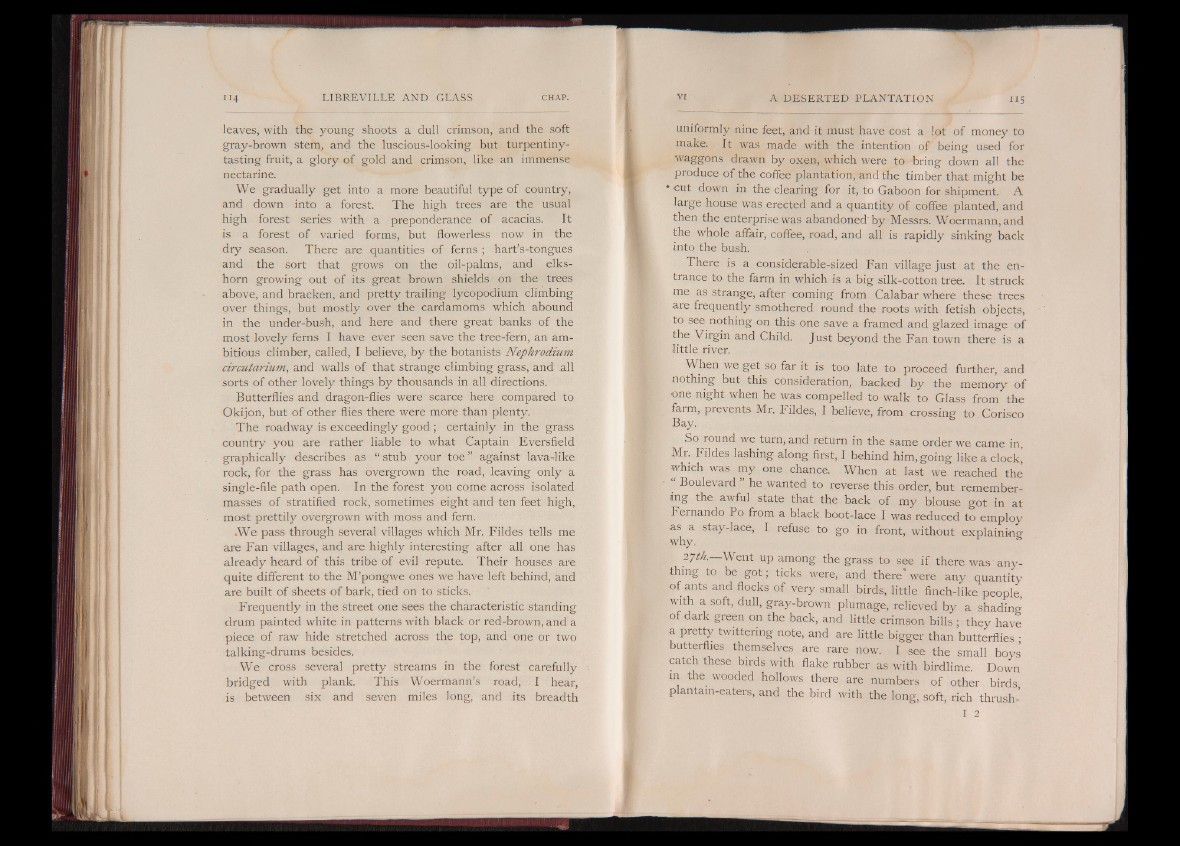
leaves, with the young shoots a dull crimson, and the soft
gray-brown stem, and the luscious-looking but turpentiny-
tasting fruit, a glory of gold and crimson, like an immense
nectarine.
We gradually get into a more beautiful type of country,
and down into a forest. The high trees are the usual
high forest series with a preponderance of acacias. It
is a forest of varied forms, but flowerless now in the
dry season. There are quantities of ferns ; hart’s-tongues
and the sort that grows on the oil-palms, and elks-
horn growing out of its great brown shields on the trees
above, and bracken, and pretty trailing lycopodium climbing
over things, but mostly over the cardamoms which abound
in the under-bush, and here and there great banks of the
most lovely ferns I have ever seen save the tree-fern, an ambitious
climber, called, I believe, by the botanists Nephrodium
circutarium, and walls of that strange climbing grassland all
sorts of other lovely things by thousands in all directions.
Butterflies and dragon-flies were scarce here compared to
Okijon, but of other flies there were more than plenty.
The roadway is exceedingly good ; certainly in the grass
country you are rather liable to what Captain Eversfield
graphically describes as “ stub your toe” against lava-like
rock, for the grass has overgrown the road, leaving only a
single-file path open. In the forest you come across isolated
masses of stratified rock, sometimes eight and ten feet high,
most prettily overgrown with moss and fern.
.We pass through several villages which Mr. Fildes tells me
are Fan villages, and are highly interesting after all one has
already heard of this tribe of evil repute. Their houses are
quite different to the M’pongwe ones we have left behind, and
are built of sheets of bark, tied on to sticks.
Frequently in the street one sees the characteristic standing
drum painted white in patterns with black or red-brown, and a
piece of raw hide stretched across the top, and one or two
talking-drums besides.
We cross several pretty streams in the forest carefully
bridged with plank. This Woermann’s road, I hear,
is between six and seven miles long, and its breadth
uniformly nine feet, and it must have cost a lot of money to
make. It was made with the intention of being used for
waggons drawn by oxen, which were to bring down all the
produce of the coffee plantation, and the timber that might be
• cut down in the clearing for it, to Gaboon for shipment. A
large house was erected and a quantity of coffee planted, and
then the enterprise was abandoned by Messrs. Woermann, and
the whole affair, coffee, road, and all is rapidly sinking back
into the bush.
There is a considerable-sized Fan village just at the entrance
to the farm in which is a big silk-cotton tree. It struck
me as strange, after coming from Calabar where these trees
are frequently smothered round the roots with fetish objects,
to see nothing on this one save a framed and glazed image of
the Virgin and Child. Just beyond the Fan town there is a
little river.
When we get so far it is too late to proceed further, and
nothing but this consideration, backed by the memory of
one night when he was compelled to walk to Glass from the
farm, prevents Mr. Fildes, I believe, from crossing to.Corisco
Bay.
So round we turn, and return in the same order we came in,
Mr. Fildes lashing along first, I behind him, going like a clock,
which was my one chance. When at last we reached the
“ Boulevard ” he wanted to reverse this order, but remembering
the awful state that the back of my blouse got in at
Fernando Po from a black boot-lace I was reduced to employ
as a stay-lace, I refuse to go in front, without exp la in in g
why, v s
27/A— Went up among the grass to see if there was anything
to be g o t ; ticks were, and there were any quantity
of ants and flocks of very small birds, little finch-like people,
with a soft, dull, gray-brown plumage, relieved by a shading
o f dark green on the back, and little crimson bills ; they have
a pretty twittering note, and are little bigger than butterflies •
butterflies themselves are rare now. I see the small boys
catch these birds with flake rubber as with birdlime. Down
in the wooded hollows there are numbers of other birds
plantain-eaters, and the bird with the long, soft, rich thrush